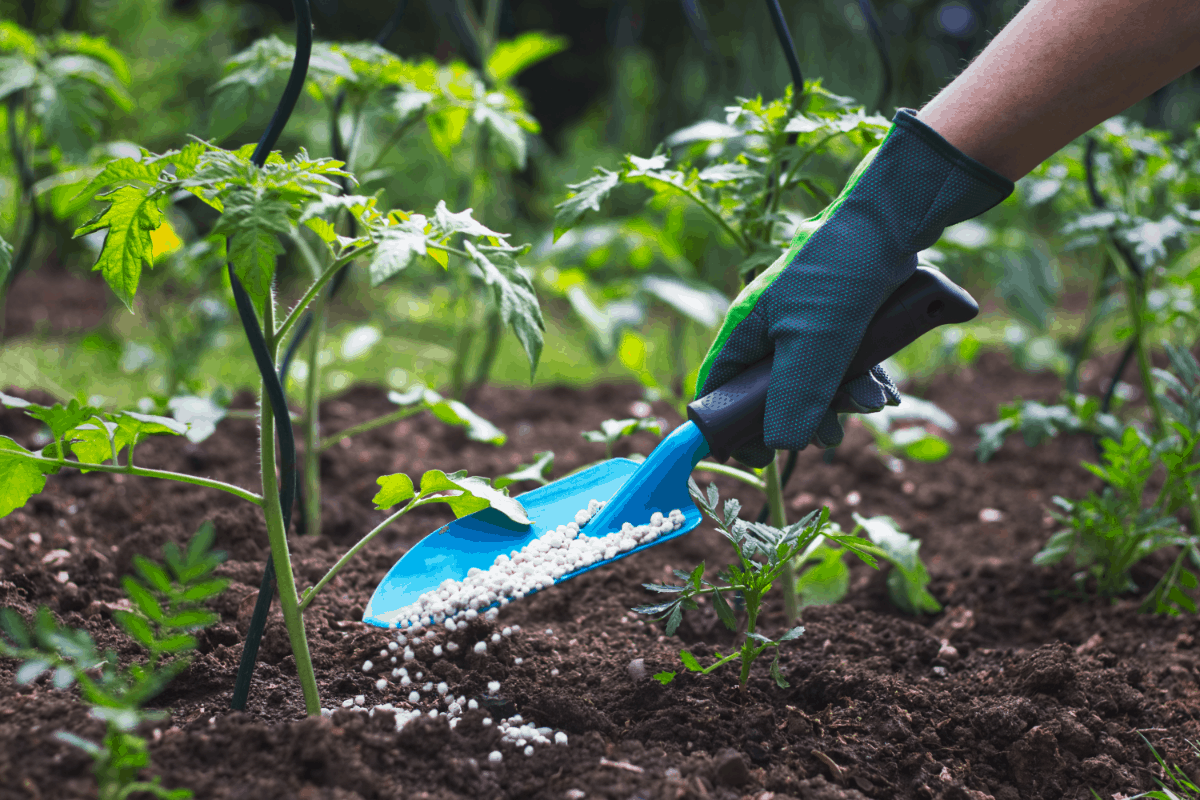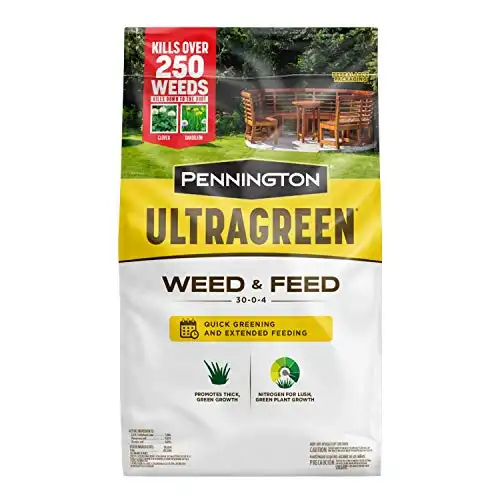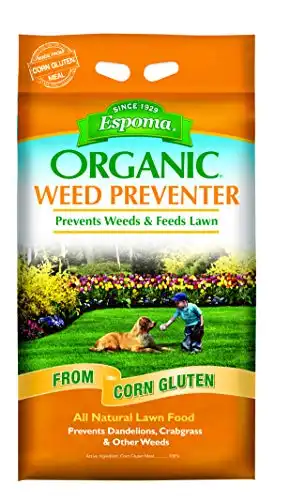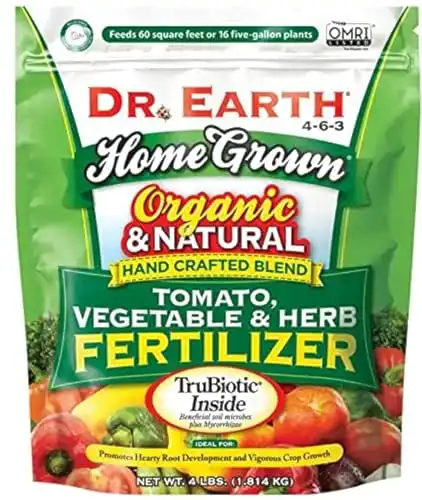One of the challenges of both small-scale and large-scale gardeners is finding the right fertilizer and herbicide to use in their gardens. This article will review some of the best organic fertilizer you can apply in your garden. We will also share a few tips on why we think you should consider buying organic feed and weed control for your garden.
We understand that maintaining your garden can be quite challenging. This is why we advocate that you consider switching to a product packed with nutrients that could help your plants grow and also function as a weed killer to prevent an invasion of your garden.
Everything we recommend
Pennington UltraGreen Weed and Feed Lawn Fertilizer | Espoma Organic Weed Preventer-25 lb. CGP25, 25 lb | Dr. Earth Organic 5 Tomato, Vegetable & Herb Fertilizer Poly Bag |
$58.10 | $53.86 | $24.17 |
Pros:
| Pros:
| Pros:
|
Cons:
| Cons:
| Cons:
|
Pennington UltraGreen Weed and Feed Lawn Fertilizer
- Dual-action: Fertilizes lawns while eliminating weeds.
- Long-lasting results: Promotes sustained lawn health.
- Covers large areas: Great for bigger lawns.
- Not suitable for all grass types: Some grass varieties may be sensitive.
- Requires careful application: Can damage lawns if over-applied.
Espoma Organic Weed Preventer-25 lb. CGP25, 25 lb
- Organic and Natural: Contains 100% natural ingredients, safe for edible plants.
- Beneficial Microbes: Enriched with microbes that improve soil health and promote nutrient absorption.
- Slow-Release Formula: Provides long-lasting nutrition, supporting steady plant growth.
- Versatile Use: Ideal for vegetable gardens, herbs, and other edible plants.
- Odor: Like many organic fertilizers, it may have a strong smell.
- Takes Time to Work: The slow-release nature means it might not provide immediate results.
Dr. Earth Organic 5 Tomato, Vegetable & Herb Fertilizer Poly Bag
- Certified Organic: Great for organic gardening, providing a safe and natural way to fertilize vegetables.
- Slow Release Formula: Feeds plants over time, promoting consistent growth.
- Enriched with Probiotics: Enhances soil health, improves plant nutrient uptake, and encourages root development.
- Versatile: Works well on vegetables, fruits, herbs, and flowers.
- Price: Slightly more expensive compared to synthetic fertilizers.
- Strong Odor: The natural ingredients may produce a strong smell.
Why You Need Fertilizers
If you are starting a new garden, you might not be aware of the importance of fertilizer application in your garden. The primary purpose of adding fertilizer to your
When selecting an appropriate fertilizer, it is important to check the ratio of nitrogen (N), phosphorus (P), and potassium (K) in the product. These three minerals are the major soil mineral requirements plants need in a fertilizer. Nitrogen stimulates the growth of healthy green leaves, which is what you should be on the lookout for in your plants.
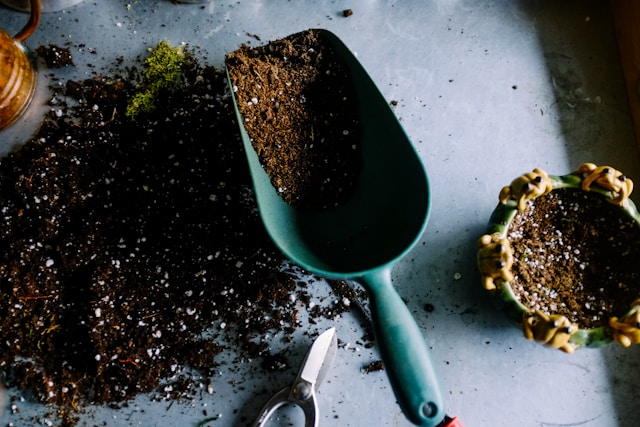
Phosphorus is responsible for the speedy growth and development of healthy roots, fruits, and flowers. The primary function of potassium is to protect the plant against disease and drought. Applying fertilizers to your
It is always best to perform a
Why You Need Weed Control
Your plants will definitely compete for
There are many herbicides available in the market. But we always advise you to get herbicides made from organic materials that are friendly to the environment. This is not to say that non-organic herbicides aren’t effective when it comes to weed control. The only problem is that they are made from chemical compounds that may be toxic to your health and the ecosystem.
Buying the Right Organic Fertilizer for Your Garden
Many brands produce weed and feed fertilizers, but not all of them are worth spending your hard-earned money on. Some of them are pretty expensive, while others are relatively affordable.
But before you go shopping for organic weed and feed for your garden, it is best to know what to look for in a quality product. We have taken the liberty of providing a short review of some of the best organic feed and weed fertilizers for your garden.
Best Weed and Feed Fertilizer for your Garden
Here are the best organic fertilizers on the market currently:
Dr. Earth Organic Vegetable Fertilizer
Dr. Earth Organic Vegetable Fertilizer is a certified organic product that promotes healthy growth in vegetables, fruits, herbs, and flowers. Its slow-release formula, enriched with probiotics, enhances
However, it has a solid natural odor, and the price may be higher than non-organic alternatives. It’s a great choice for gardeners looking for eco-friendly, nutrient-rich fertilizer.
- Certified Organic: Great for organic gardening, providing a safe and natural way to fertilize vegetables.
- Slow Release Formula: Feeds plants over time, promoting consistent growth.
- Enriched with Probiotics: Enhances soil health, improves plant nutrient uptake, and encourages root development.
- Versatile: Works well on vegetables, fruits, herbs, and flowers.
- Price: Slightly more expensive compared to synthetic fertilizers.
- Strong Odor: The natural ingredients may produce a strong smell.
Espoma Organic Weed Preventer
Espoma Organic Garden-tone is an all-natural and organic fertilizer specifically formulated for vegetable gardens. It contains a balanced mix of nutrients, including nitrogen, phosphorus, and potassium, with additional beneficial microbes that enhance
This slow-release fertilizer supports steady plant growth, promoting robust roots and abundant yields. It’s safe for use on edible plants and ideal for eco-conscious gardeners looking to boost their vegetable and herb production. Garden-tone is easy to use and delivers consistent, long-lasting results.
- Organic and Natural: Contains 100% natural ingredients, safe for edible plants.
- Beneficial Microbes: Enriched with microbes that improve soil health and promote nutrient absorption.
- Slow-Release Formula: Provides long-lasting nutrition, supporting steady plant growth.
- Versatile Use: Ideal for vegetable gardens, herbs, and other edible plants.
- Odor: Like many organic fertilizers, it may have a strong smell.
- Takes Time to Work: The slow-release nature means it might not provide immediate results.
Pennington Signature Series Weed and Feed Fertilizer
Pennington UltraGreen Weed & Feed Fertilizer is a dual-purpose product designed to feed lawns while controlling weeds.
Its formula promotes lush, green grass, effectively targeting common weeds like dandelions and clover. Suitable for use on warm and cool-season grasses, it covers up to 5,000 square feet.
- Dual-action: Fertilizes lawns while eliminating weeds.
- Long-lasting results: Promotes sustained lawn health.
- Covers large areas: Great for bigger lawns.
- Not suitable for all grass types: Some grass varieties may be sensitive.
- Requires careful application: Can damage lawns if over-applied.
Final Thoughts
You are responsible for choosing the right organic weed and feed fertilizer for your garden. You should perform a
Which weed and feed fertilizer do you use in your garden? We’d like to hear about your experience in the comment section.
Pennington UltraGreen Weed and Feed Lawn Fertilizer | Espoma Organic Weed Preventer-25 lb. CGP25, 25 lb | Dr. Earth Organic 5 Tomato, Vegetable & Herb Fertilizer Poly Bag |
$58.10 | $53.86 | $24.17 |
Pros:
| Pros:
| Pros:
|
Cons:
| Cons:
| Cons:
|
Pennington UltraGreen Weed and Feed Lawn Fertilizer
- Dual-action: Fertilizes lawns while eliminating weeds.
- Long-lasting results: Promotes sustained lawn health.
- Covers large areas: Great for bigger lawns.
- Not suitable for all grass types: Some grass varieties may be sensitive.
- Requires careful application: Can damage lawns if over-applied.
Espoma Organic Weed Preventer-25 lb. CGP25, 25 lb
- Organic and Natural: Contains 100% natural ingredients, safe for edible plants.
- Beneficial Microbes: Enriched with microbes that improve soil health and promote nutrient absorption.
- Slow-Release Formula: Provides long-lasting nutrition, supporting steady plant growth.
- Versatile Use: Ideal for vegetable gardens, herbs, and other edible plants.
- Odor: Like many organic fertilizers, it may have a strong smell.
- Takes Time to Work: The slow-release nature means it might not provide immediate results.
Dr. Earth Organic 5 Tomato, Vegetable & Herb Fertilizer Poly Bag
- Certified Organic: Great for organic gardening, providing a safe and natural way to fertilize vegetables.
- Slow Release Formula: Feeds plants over time, promoting consistent growth.
- Enriched with Probiotics: Enhances soil health, improves plant nutrient uptake, and encourages root development.
- Versatile: Works well on vegetables, fruits, herbs, and flowers.
- Price: Slightly more expensive compared to synthetic fertilizers.
- Strong Odor: The natural ingredients may produce a strong smell.
FAQ: Best Organic Fertilizer
1. What is the best organic fertilizer for vegetable gardens?
The best organic fertilizers include compost, manure, and products like fish emulsion or Espoma Garden-tone for rich nutrients.
2. How often should I apply organic fertilizer?
Most organic fertilizers should be applied every 4-6 weeks, but this depends on the product and the plant’s needs.
3. Can organic fertilizers be used for all plants?
Yes, organic fertilizers can be used on most plants, but it’s essential to choose the right type for your specific plant needs.
4. What are the benefits of organic fertilizers?
Organic fertilizers improve
5. Are organic fertilizers better than synthetic ones?
Organic fertilizers are better for long-term
